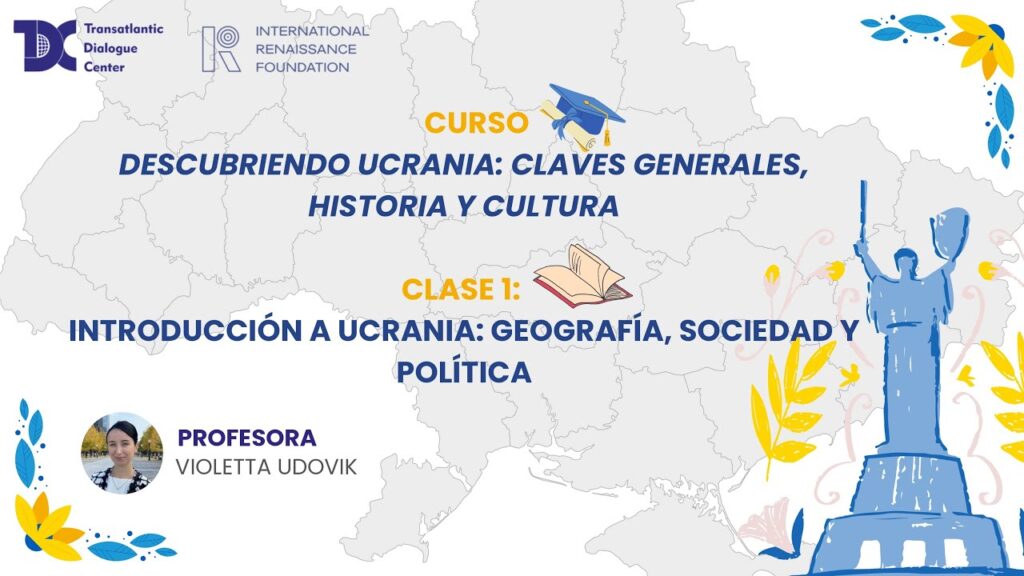Im Rahmen des Kooperationsprogramms zwischen Spanien und Lateinamerika startete das Transatlantic Dialogue Center den Kurs „Die Ukraine entdecken: Schlüsselkonzepte, Geschichte und Kultur“. Diese vierteilige Vortragsreihe, die vollständig auf Spanisch gehalten wurde und von der International Renaissance Foundation, unterstützt wurde, bot eine leicht verständliche Einführung in die Geografie, Geschichte, Politik und kulturelle Identität der Ukraine. Fast 400 Teilnehmer*innen aus Argentinien, Chile, Kolumbien, Mexiko, Peru, Uruguay, Spanien, der Dominikanischen Republik und Paraguay meldeten sich an, was das große Interesse der spanischsprachigen Welt an der Ukraine widerspiegelt. Die Vorträge sind auch auf YouTube verfügbar, sodass sie einem breiteren Publikum zugänglich sind.

Der Kurs wurde von Wioletta Udowik geleitet, einer Politologin und Doktorin der Geschichte mit umfangreicher Erfahrung sowohl als Diplomatin als auch als Forscherin. Sie veröffentlicht regelmäßig für lateinamerikanische Medien und ist Autorin eines Buches über die Beziehungen zwischen Japan und der Ukraine. Ihr akademischer Hintergrund und ihre praktischen Einblicke schufen eine einzigartige Lernerfahrung, die die Vergangenheit und Gegenwart der Ukraine mit globalen Debatten verband.
Überblick über die Vorträge
Unterrichtseinheit 1: Einführung in die Ukraine: Geografie, Gesellschaft und Politik: Dieser Vortrag vermittelte grundlegende Kenntnisse über die geografische Lage der Ukraine, ihre wichtigsten gesellschaftlichen und politischen Merkmale sowie die grundlegenden Aspekte, die ihre nationale Realität prägen.
Unterrichtseinheit 2: Geschichte der Ukraine I: Von den Anfängen bis 1991: In dieser Sitzung wurden die tiefen historischen Wurzeln des ukrainischen Volkes von seinen antiken Anfängen über die Zeit der Kyjiwer Rus bis hin zur Kosakenzeit beleuchtet. Außerdem wurde erläutert, wie Russland versucht hat, sich die Geschichte und Kultur der Ukraine anzueignen, und es wurde der Kampf um die Staatsgründung im 20. Jahrhundert untersucht.
Unterrichtseinheit 3: Geschichte der Ukraine II: Von 1991 bis heute: Dieser Teil konzentrierte sich auf den Weg der Ukraine seit der Wiedererlangung ihrer Unabhängigkeit im Jahr 1991 und beschrieb detailliert ihre Konsolidierung als souveräner Staat. Es wurden zwei Phasen des andauernden russisch-ukrainischen Krieges analysiert, die modernen Errungenschaften der Ukraine hervorgehoben und die wesentliche Rolle der internationalen Unterstützung bei der Suche nach dauerhaftem Frieden diskutiert.
Unterrichtseinheit 4: Ukrainische Kultur und Identität: Der letzte Vortrag würdigte den reichen kulturellen Bildteppich der Ukraine. Sie befasste sich mit den wichtigsten nationalen Symbolen, dem materiellen und immateriellen Erbe sowie der lebendigen literarischen Tradition des Landes. Außerdem wurden die Grundwerte untersucht, die die ukrainische Identität im Laufe der Geschichte geprägt haben und auch heute noch die Nation prägen.
Der erfolgreiche Abschluss des Kurses „Die Ukraine entdecken: Schlüsselkonzepte, Geschichte und Kultur” hat ein großes Interesse an dem Land in Lateinamerika und Spanien gezeigt. Dieses starke Engagement unterstreicht den klaren Bedarf an differenzierten Informationen, die über die typischen geopolitischen Narrative hinausgehen. Das Ergebnis des Kurses macht deutlich, dass weitere Anstrengungen erforderlich sind, um das Wissen über die Geschichte, Kultur und nationale Identität der Ukraine zu erweitern und so ein umfassenderes Verständnis für das Land und seine Bevölkerung zu fördern.